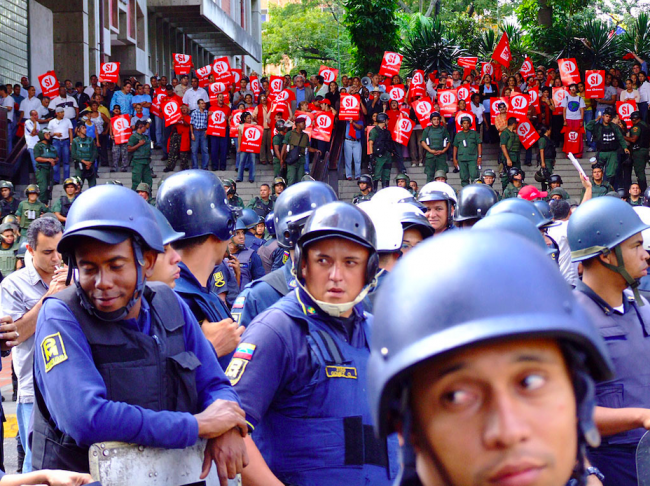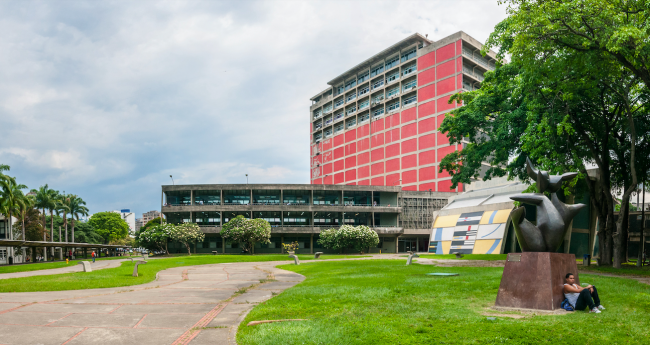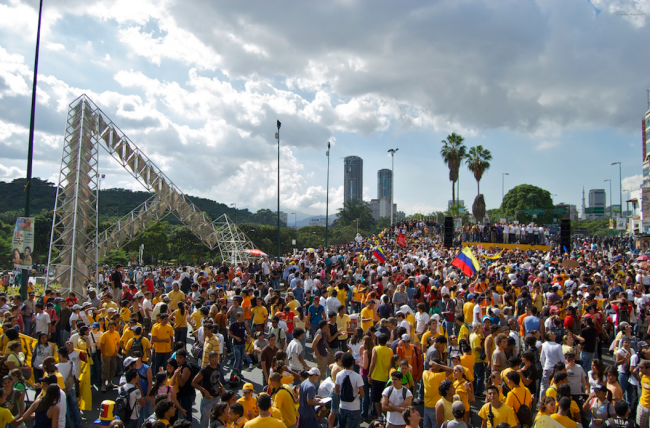
This piece is part of our Spring 2022 issue of the NACLA Report.
Leer este artículo en español.
In the decades before Hugo Chávez’s election as president in 1998, university students were often at the forefront of some of the most radical left movements in Venezuela. In the Chávez era, campuses would again become hotbeds of organizing and mobilization, this time in fierce opposition to Chavismo’s brand of left politics. That movement peaked in 2007 amid violent clashes with the government over media censorship, then again in 2014 amid a major crime wave following Chávez’s death, and in 2017 as Nicolás Maduro moved to nullify the opposition-controlled legislature.
But while Venezuela’s student movement grew into a bastion of anti-Chavismo, leftist youth continued to claim spaces for mobilizing and organizing in their own right, even as their relationship with an ever more statist, top-down Chavista project generated deep tensions. For some, like Damian Alifa, those tensions would prove untenable.
Alifa is a sociologist and researcher trained at Venezuela’s flagship Universidad Central, long an opposition stronghold. During Chávez’s second term in office from 2006 to 2012, Alifa played key roles in Chavista student and youth organizing. He distanced himself from the government in 2014 and finally broke with it in 2016 amid unprecedented political and economic crises that continue to this day. In this interview, Alifa reflects on his experiences and the implications for the future of the Left in Venezuela at a time when university infrastructure and labor and study conditions are extremely precarious. Our conversation, held by videoconference, has been edited for length and clarity.
Fabrice Andreani: Tell us a bit about your political trajectory.
Damian Alifa: I come from a very republican family of Spanish origin. When I was 14 years old, I sympathized with some elements of the Communist Party. But I developed politically mainly beginning in 2005 in the Marzo 28 student movement, which had greatest reach within the Universidad Central de Venezuela (UCV). I got involved in different leftist movements that support Chavismo. In 2008, I participated in the founding of the Partido Socialista Unido de Venezuela (PSUV) and became a delegate in its Youth Congress.
I experienced the effervescence created by the demonstrations of the so-called 2007 generation, in which opposition student forces were already much larger than Chavista ones. The government had shut down the private television station RCTV and wanted to approve a “socialist” constitutional reform through a popular referendum. There were student marches, and the UCV was one of the most important epicenters of the movement, whose message was one of “freedom” against “communism.”
It was a time of much polarization and confrontation, and the university was in the eye of the storm: anything that happened in the autonomous universities became news. Important figures emerged on both sides. In the opposition, leaders came up who at first seemed like they would eclipse the old leadership; in Chavismo, some went on to be ministers.
In the UCV, we were an overwhelming minority in the face of an oppositionboth of students and professorsthat controlled almost all the university’s faculties and authorities. Still, it was an interesting space, with much exchanging of ideas, debate, and conversation with the opposition in classrooms and conferences.
After leaving the student movement in 2012, I started to disagree with the government, questioning its management of the economy, its corruption, and the lack of democracy within the PSUV. I broke with the government as things were reaching a more critical point, like when the Supreme Court usurped the opposition-held National Assembly in 2016 and the government convened a regime-designed National Constituent Assembly in 2017, which, in my view, confirmed an authoritarian turn within Chavismo.

FA: It seems that almost since the beginning, Chavismo was a minority among students. How do we explain that?
DA: It’s no secret that Chavismo wasn’t built from a large social movementwhether of students, workers, or campesinosor a strengthening of leftist parties. Chávez appeared on the public eye after the failed coup against the Acción Democrática (AD) government in 1992, and he gradually became a charismatic figure, creating great expectations not only among popular sectors. At the beginning, he also had the support of the middle class, which saw him as a kind of avenger against the corruption of the two traditional parties, AD and COPEI, as well as a figure representing law and order.
Once Chávez entered office, many important university leaders moved into government roles. These small movement structures were weakened, and others were born, but not in the traditional left spaces. Far from the factories and students, these were instead close to marginalized areas and extreme poverty. Organizations with different logics were built.
In 2001, the occupation of the UCV’s rectorythe inception of the Marzo 28 movementcalled for the university to transform itself to get in tune with the country, communities, and the 21st century. It called for renewal, for opening space for discussion, and for overhauling how authorities were elected. The students who participated identifiedsome to great extentwith the Chávez government, but it was a broad coalition with many people who lacked clear a partisan orientation.
The opposition and authorities thoroughly derided this process as a “government takeover,” an action ordered by Chávez to take control of the UCV. The autonomous universities have a history of tension with all governments, which is linked to disputes over budgets and independence. An anti-government ethos developed.
In addition, by 2001, the middle classto which the majority of university students belonghad grown disenchanted with Chávez, who didn’t turn out to be a caudillo of law and order but rather a populist. With the rectory takeover, the occupiers began to clash with professors and students who opposed them. Some of the occupiers decided to negotiate, and those who held outworkers and students eventually dragged out of the rectory by a rally of opposition students and professorswere expelled for five years.
It symbolized a major defeat of Chavismo in the universities, as the UCV was one of the country’s most important universities. Chavismo struggled to rebuild successful electoral proposals within the autonomous universities because most believed that the government wanted to take control of the university, and so it needed to be defended. A process of decline began: we went from being a fragmented student Left, with scarce mobilizing capacity but with some representation, to being a clear minority. And the same happened in the other autonomous universities, except maybe the Universidad de Oriente. In 2002 and 2003, when intense and violent confrontations shook the country with events like the oil strike and the coup, Chavismo had already been defeated in the university.
In addition, most middle-class students at the autonomous universities were children of parents who enjoyed the fruits of the oil bonanza in the 1970s. But in the 1980s and 1990s, the decline of the petro-state led them to embrace more conservative ideas. These parents watched the popular uprising of the 1989 Caracazo in horror, as lootings provoked terror. The Caracazo also went on to change Caracas’s urban landscape with gated neighborhoods, bars, walls, and security guards. Rates of violence spiked in the 1990s.
The children of this generation in some ways inherited and consumed that fear. In fact, one of the key events in organizing the opposition movement was the case of the Faddoul brothers, three youths who were kidnapped and murdered in 2006.
But these children were also part of the first generation that grew up with the internet at their fingertips, with satellite TV, and with a view fixed outside the country. In some sense, this led to overvaluing what happened abroad and disdaining the idea of what’s ours. They adopted what Venezuela psychologist and political scientist Maritza Montero has called an alter-centered identity. And from the outset, Chavismo presented itself as the opposite: about appreciating what’s ours from a national perspective. This middle class expressed its rejection of Chávez in the university.
FA: At that time, I knew Chavista students who were both supportive and critical of the closure of RCTV, and even more so of the 2007 proposed constitutional reform, as well as opposition students who were upset with their leaders. It seems like partisan polarization wiped out any vaguely autonomous stance within the student world.
DA: We have to keep in mind that, as of 2003, the government began a strategy to weaken the autonomous universities’ importance by creating an array of parallel universities, like the Universidad Bolivariana de Venezuela, and other experimental institutions. Indeed, there were gains, like opening up the Universidad Nacional Experimental de las Fuerzas Armadas (UNEFA), which was for members of the military and their families, to civilians. However, in these universities, often there was an attempt to create movements from the top down, and because they were allies of the government, they could not wage their own struggles. This cost them a lot of credibility. In many cases, they didn’t even have the right to elect their own leaders nor fight against them.
Although these universities had mobilizing capacity and financial support to confront the opposition, they didn’t manage to consolidate an autonomous student movement. As much as they may agree with the government or be part of the Left, student movements must be anti-establishment and rebellious. They must push the envelope, because if not, they will become co-opted movements. And that’s what happened.
So, those of us who were not in alternative universities had to defend government stances in a mostly opposition university. We were confrontational with the authorities, but we fell into some contradictions. For example, the student movement would march to demand more funding, and although many of us agreed with that demand, it was very difficult to express our support in such a polarized environment. Defending that cause would have branded us opposition members. Similarly, if the opposition student movement had criticized the authorities, generally members of the opposition, over the lack of accountability and internal democracy, they would have been labeled Chavistas.

This dynamic of excessive partisan polarization did a lot of damage both to the Chavista student movementdue to its lack of criticism of the governmentand to the opposition student movement, which refused to speak out about serious institutional problems that persist within the traditional universities. This resulted in co-optation on both sides. Chavismo practically disappeared from the university, and the opposition students confront the very authorities they used to defend.
In fact, the 2014 wave of protests known as the guarimbas was the last significant, big student mobilization. Chávez had died, the results were very narrow in the 2013 presidential election between Nicolás Maduro and Henrique Capriles, and rumours of fraud had spread. And this created major discontent in the opposition.
That attempted insurrection had an enormous cost for the opposition, not just in terms of repressionthe prosecution of students accused of participating in violent actsbut also because every defeat comes with demoralization and disaffection. Right after came the most difficult period of the economic crisis, with skyrocketing inflation, shortages, and long lines. And we started to see a massive exodus of students leaving the country amid widespread political disillusionment. In addition, professor’s salaries plummeted. And this created an environment of apathy and debilitation in all universities. The massive protests in 2017 weren’t student protests per se, but rather popular and middle-class protests.
Today, the university realm is dealing with a hot potato: the problem of leadership renewal has created a lot of tension between professors and students over how the university should be directed and how to overhaul it without government middling. But the authorities, some of whom have served in their roles for more than 10 years, are not interested in leaving. And this all comes in a climate of general political apathy, which goes beyond the student movement. It affects the labour movement and other movements and organizationseven the communal councils. Organizations have emptied out because the people are more focused on survival, migrating, or focusing on their personal lives.
FA: How can Venezuela get out of this labyrinth? How can it build or rebuild a democratic Left, both in the universities and in the popular and marginalized sectorsin the barrios, the ies, the countryside?
DA: Clearly, after everything that has happened with Chavismo, especially under Maduro, it is extremely complicated to imagine a new leftist movement in Venezuela.
There was never a movement here like CONAIE in Ecuador or the different movements within the Movement Toward Socialism (MAS) in Bolivia, which have autonomy and the capacity to contend with charismatic leaders. In the face of Chávez, the Left had no capacity or autonomy to support him while remaining critical. Rebuilding and valuing social movements’ autonomy is key.
On the other hand, returning to the university issue, the university always does a lot of navel gazing. The student movement is reluctant to participate in professors’ actions, and professors are reluctant to participate in student mobilizations, let along workers’ movements.
In those years from 2008 to 2012, there certainly were small organizations that supported struggles beyond the university, like the Indigenous Yukpa land struggles in the Perijá mountains, or commune members’ movement for more autonomy, or mining issues. And since there wasn’t and still isn’t a strong union organizing presenceexcept perhaps in Bolívar state, with occupied and seized companieswe have not seen solidarity organizing on the whole.
Student movements responded a lot to the university’s particular dynamics. They spoke out about big national issues, but with little impact in alliances and specific rights demands. And the university has increasingly fewer links with distant struggles and demands. Today, students are trying to survive, just like any other worker. Only a few small groups remain that can dedicate themselves to politics.
The economic crisis and the general collapse of the universities provoked a very horizontal dynamic. The professors who used to have a lot of power and authority have lost that power and often don’t make enough money to even get to class. Between workers and students, there is now less tension than before, because they face the same struggles and problems, like lacking a dining hall and the most basic goods. Perhaps this will create the conditions to rethink the university in a more collective way.
The Venezuelan political scientist Alfredo Maneiro used to say that we need to go “beyond the left.” I think that’s the way, not only to rebuild the student movement but also to elaborate more spaces of struggle in a careful effort to reclaim the achievements that have been snatched away and to take stock of these past 20 years. It’s a lengthy task that cannot be taken up from the starting point of leftist sectarianism. We must build a broad front, find points of agreement with other movements, and from there salvage the Left’s credibility and its place in the struggle. And this should start with a real struggle for the historic gains of the student movement that have been undercut: scholarships, university autonomy or self-management, and professors’ wages.
It’s an extremely precarious situation, with a lot of apathy and very poor management on the part of the authorities. We must foster activities that recreate university life as it once was, where despite all the mistakes and polarization, there was sharing of ideas, debate, opposing proposals, and creative tensions. We need a lot more creativity to see how we can rebuild a center-left that engages with society from the university and vice versa, and that engages with youth and studentsoutside the comfort zone of the traditional opposition parties or the tiny leftist groups immersed in their narcissistic lost causes and small reading groups of few people with ancient vocabularies and repetitive practices. Thinking beyond the left is key to rebuilding a Left in Venezuela.
Fabrice Andreani is a political scientist, doctoral candidate at the Université Lumière Lyon 2.
Damian Alifa is a sociologist and researcher graduated from the Universidad Central de Venezuela (UCV).
Translated from Spanish by NACLA.

